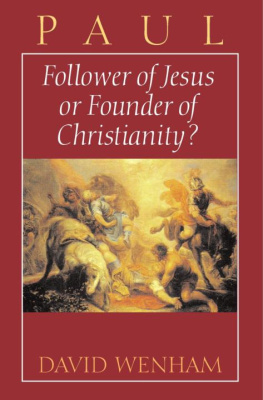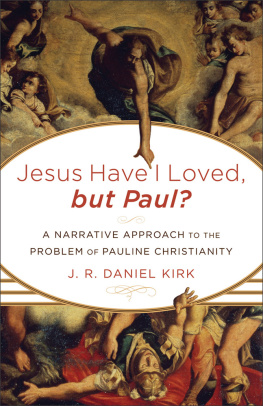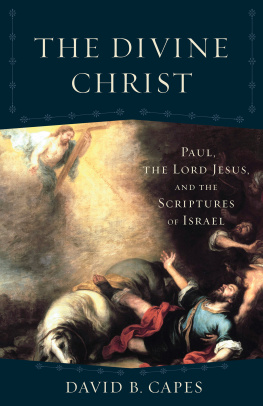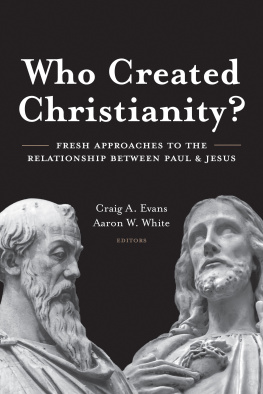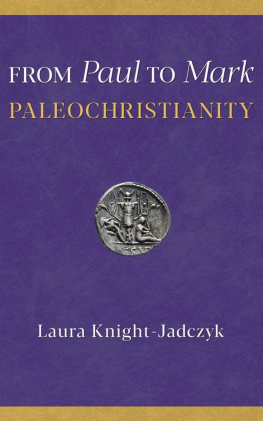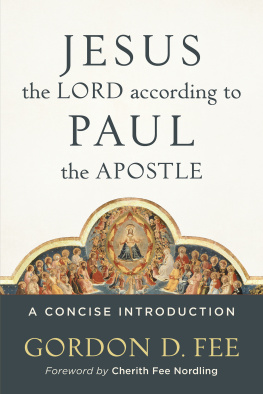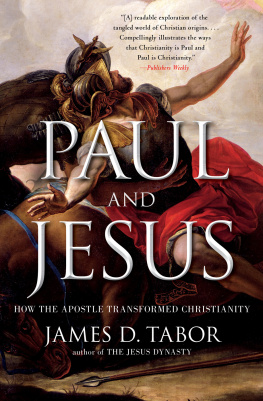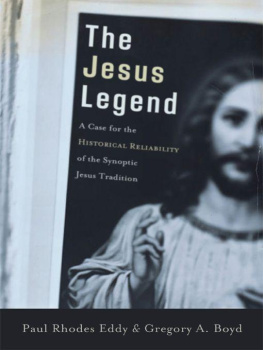DAVID WENHAM



xiv
xv
... 295
A friend who heard that I was writing this book paused and commented "I find Paul difficult." She speaks for many people, and I hope that this book may help a little. I have worked on the question of Paul and Jesus over a period of years, and I have written a number of detailed studies, some quite technical. This is an attempt to offer a broader look at the question for a wider audience. I have been conscious of trying to serve two masters in the book - by reaching for that wider audience and by addressing questions of scholarly debate - and it has been difficult to do so. I hope nevertheless that the discussion, despite its limitations, will be of wide interest.
Many people have contributed to this book directly or indirectly. I would especially like to thank Michael Thompson, Paula Gooder, Peter Ensor, and Idicheria Ninan for reading the manuscript and for all their criticisms and valuable suggestions. I am also grateful to the principal and staff of Wycliffe Hall for allowing me study leave during 1993 to complete the book. I owe much to my family, especially to my wife Clare, who has been a constant support and encouragement.
Wycliffe Hall, Oxford


Two people dominate the pages of the NT more than any others: Jesus and Paul. These two men were quite different from each other in many ways: Jesus was a charismatic prophetic figure from Galilee, Paul a Greek-speaking intellectual and letter writer. But both played a vital part in the establishment and early development of the Christian movement. The question being addressed in this book is: What was the relationship between these two influential men?
But according to the book of Acts, Paul came into contact with followers of Jesus very soon after Jesus' death. He fiercely opposed them at first, but then after his dramatic conversion he joined them and became (in his own words) a "slave of Jesus Christ" (Rom 1:1).
It is commonly assumed that from this point on Paul's relationship to Jesus was that of a faithful follower. As a self-confessed "slave" of Jesus - and like other Christian converts through the ages - he was very interested in the life and teaching of his master. He held Jesus in the highest regard and tried to base his own life and teaching on what he knew of Jesus. So it is supposed.
However, that assumption about Paul has not gone unchallenged. Indeed, in recent years a quite different view has become influential. Far from meekly following Jesus, it is suggested that Paul was an innovator who brought into Christianity all sorts of ideas and emphases that complicated and spoiled the original, simple religion of Jesus.
He agrees with Armstrong about Paul's other unpleasant contributions to Christianity.

So was Paul a faithful follower of Jesus or the founder of a new religion? Or is the truth somewhere between those two positions? What evidence is there that will help us answer this question?

The data
One of the most embarrassing facts for those who see Paul as a follower of Jesus is his failure to refer much to Jesus' life or teaching. In his letters Paul refers very frequently to the death and resurrection of Jesus, but as for Jesus' birth, baptism, miracles, parables, transfiguration, etc., there is a deafening silence. As for the sayings of Jesus, Paul hardly quotes them at all, at least explicitly.
There are two exceptions to this silence. The first is 1 Cor 7:10, where Paul refers to Jesus' teaching on divorce:
The other is 1 Cor 9:14, where Paul writes:
Some suspect that he also does so on other occasions. But there is little unanimity on those other occasions, and so the undisputed references to the teaching of Jesus in all of Paul's writings are very few indeed.
Even with the two verses in question, 1 Cor 7:10 and 9:14, it is argued that Paul cites the teaching of Jesus rather freely and without evident enthusiasm: Thus in 7:10 he mentions Jesus' prohibition of divorce, but then proceeds to give his own regulations on divorce in the church. In 9:14 he refers to Jesus' teaching on paying missionaries, but does so in the context of an explanation of why he, Paul, does not accept payment for his ministry.
Explanations of Paul's silence
What is to be made of Paul's almost total silence in regard to Jesus' teaching and life before his passion? The obvious conclusion, as it has seemed to many, is that Paul was not interested in the pre-passion ministry of Jesus and may in fact have been quite poorly informed about it. This may seem a surprising conclusion. But the argument is logical enough: Had Paul known much about Jesus' ministry and teaching and had they been important to him, he (like modern Christian preachers) would surely have referred to them continually. In fact he does not.
Wilson's concession of victory to Bultmann on this point sounds rather decisive, but it is certainly not the final word on the matter. A significant number of scholars see things very differently, and some indeed offer almost exactly the opposite explanation from Bultmann in seeking to account for Paul's silence. They argue that Paul's explicit quotations from Jesus' teaching are infrequent because he takes knowledge of Jesus' teaching for granted. Paul does not need to quote from it often because he and his readers have been taught it and know it well. In his letters his task is to discuss what is disputed and unclear, not to repeat what is already very familiar.
However, those who take the opposite view to that of Wilson argue that the few direct quotations show some knowledge on Paul's part and also that there are numerous possible or probable allusions to Jesus' teaching in Paul's letters, which is precisely what might be expected if that teaching is presupposed. The problem with this last argument is that recognizing allusions can be a very subjective business: Some scholars see allusions everywhere and others fail to recognize them anywhere.
or Paul's nonuse of stories and sayings of Jesus could have arisen from a combination of these factors.
Paul's failure to refer explicitly to the teaching and ministry of Jesus may therefore be variously explained. There is no scholarly consensus on the explanation, and the issue deserves continuing attention.

